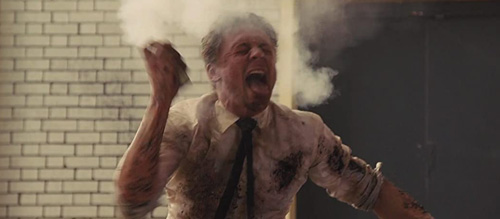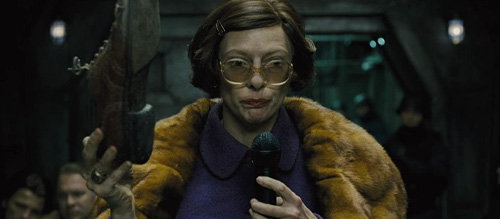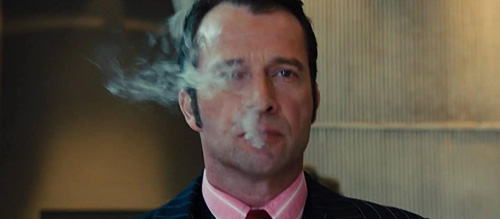Prone to Bouts of Mania, Narcissism and Power Failure: Watching High-Rise and Snowpiercer in 2021
When they were first released, High-Rise and Snowpiercer could have both been seen as overblown, style-over-substance class warfare parables. They were also outliers in the usually modest (at the time) careers of their directors, Ben Wheatley and Bong Joon-ho: science-fiction films with big stars attached. In the year 2021, the dystopian sci-fi set on a confined retrofuturist train segregated by class and the dystopian sci-fi set in a confined retrofuturist tower block segregated by class both feel all-too real to a world worn down by a year of confinement and ongoing issues of inequality. The world may be opening up again, but what we’ve all been through in recent times has changed how these films can be viewed forever.
As High-Rise‘s sort-of-protagonist Dr Robert Laing, Tom Hiddleston arrives in his pristine but soulless new home, filled with all the mod-cons but lacking in any semblance of individual personality. A neighbour posits that “This building is nowhere near as homogenous as you might think”. That goes for the wider film as well, and also applies to Snowpiercer; each film may have a huge name from a Marvel movie at their head, and technical polish to spare, but they will by no means be presenting us with easy entertainment or easy-to-swallow views of the workings of the world we live in.
When High-Rise was first released in 2015, the British class system might have seemed much harder to delineate, but with subsequent Conservative UK Governments rife with cronyism, Wheatley’s Ballard adaptation now seems a chillingly plausible allegory for the current predicament of the super-rich and super-powerful running so much of the world unopposed. Six years ago, the scene where the top level residents throw a party dressed as bewigged, powdered aristocrats and lambast Dr Laing for turning up only in a nice suit like some sort of pleb seemed absurd. Now it feels like a particularly pointed satire.
Snowpiercer‘s most active villain, Minister Mason (Tilda Swinton), makes the societal divide clear in her first scene delivering a speech to a captive audience of inhabitants of the great train’s tail section: “We must all of us on this train of life remain in our allotted station. We must each of us occupy our preordained particular position”. Everyone has their pre-allotted place; rich or poor, powerful or powerless, hat on the head or shoe on the foot. It’s this way because it always has been, and that’s how the powerful stay in power, by forcefully pushing back against any suggestion of change.
In Snowpiercer, the whole of society is divided according to the train ticket they could afford just as the world came to an end. The poor boarded the train at the rear and stayed there, freezing, starving and overcrowded like mistreated cattle. The rich bought luxury and comfort, from saunas to nightclubs, restaurants to classrooms for their spoiled and entitled children, each at the head of the train. The tail-enders barely survive on rationed protein blocks and are kept too weak and poorly resourced to mount any kind of organised resistance. That is until the day Curtis (Chris Evans) starts counting how long the doors to the forward carriages stay open during supply runs and more significantly that the armed guards don’t appear to have actually fired their guns for some time. It is he who insights a full-blown rebellion.
The most shocking of Snowpiercer’s late-in-the-game plot twists is not that Curtis and others resorted to inhuman atrocities out of desperation in their early years on the train, but that every attempted uprising has been to a large extent agreed by the respective leaders of the tail and head sections, to be just destructive enough to form the function of much-needed population control. You can’t help but to think of such ideas of sanctioned mass-death in terms such as herd immunity, and even if outright conspiracy theories are nonsense, consider some of the consequences of government-mandated lockdowns during the coronavirus pandemic. The world hasn’t quite ended for us but certain classes are firmly in control and responsible for the veritable chasm that divides quality of life with restrictions imposed.
Both films use exaggerated, emblematic imagery and big, pantomime performances for the villains that would overturn most films to make a point. High-Rise‘s Pangbourne (James Purefoy) is the most evil of upper-class twits, like something from a Monty Python sketch but far more sinister and inclined to get his TV executive mate to beat you with his BAFTA if you cross him. Pangbourne walks like Monsieur Hulot (leading with his ever-present pipe) and sneers and barks as his main form of communication. In Snowpiercer, Tilda Swinton’s Mason is identifiable first by her severe Thatcher-gone-wrong haircut, eye-distorting glasses and clearly false teeth, then she starts speaking in a strangled Northern brogue. She is the unholy union of the Iron Lady and the unions she oppressed. Both are prone to speechifying to justify (as if they have to) their allotted place of privilege and superiority, and neither will hesitate to brutally suppress any murmurs of uprising.
It’s interesting to note that both films use the control of resources as a plot-driver, whether it’s food, water (including booze to liven up upper-class parties of course) and power in High-Rise or food, water and ammunition in Snowpiercer. The main difference is that the lower classes in High-Rise could conceivably leave their tower block in an emergency and not freeze to death like the unfortunate passengers of Snowpiercer; but where would they go? Their whole life is in this building and giving it up would mean starting again.
Snowpiercer and High-Rise were curiosities when they released last decade, but hindsight and terrifying changes in the real world have given them new power and relevance as socially conscious art. Both Bong Joon-ho and Ben Wheatley have hit higher highs since, but the explicit political and social commentary were packaged in their films for our consideration years ago, they just eerily accurately spotted what direction societies were heading in and presented it to us as entertainment long before the world went to hell in a handbasket.
Enjoy your newfound freedoms while you are able, but don’t accept your allotted place without question – you’re only a shoe if you want to be, if you stop fighting for your right to equality.




